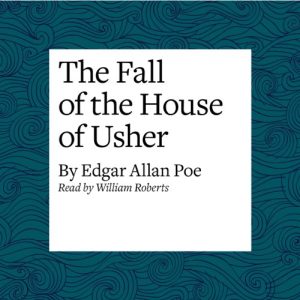The Fall of the House of Usher Audiobook: Whispers from the Abyss
As the rain tapped against my window and shadows stretched across my room, I found myself reaching for Edgar Allan Poe’s The Fall of the House of Usher Audiobook, narrated by the mesmerizing William Roberts. The October air carried with it a crispness that seemed to mirror the Gothic chill awaiting me in this 50-minute descent into one of literature’s most unsettling masterpieces. With headphones snugly in place, I braced myself for an auditory journey into madness, decay, and despair – a journey that would linger long after the final word was spoken.
Poe’s genius lies not only in his mastery of language but in his ability to evoke a creeping dread that coils around your thoughts like mist over a moonlit marsh. In this tale, we follow an unnamed narrator as he visits his childhood friend Roderick Usher, whose crumbling mansion is as much a character as its inhabitants. The house groans under the weight of its secrets, each stone steeped in foreboding. It’s a story where every shadow has depth, every silence has sound, and every heartbeat feels like a countdown to inevitable doom.
William Roberts’ narration elevates this already atmospheric tale into something otherworldly. His voice possesses a haunting timbre – velvety yet edged with unease – that perfectly complements Poe’s intricate prose. As Roberts describes the decaying mansion or Roderick’s ghostly pallor, you can almost feel the dampness seeping into your bones. His pacing is impeccable; he lingers on phrases just long enough to let their weight settle but never so long as to disrupt the narrative flow. And when he gives voice to Roderick or Madeline Usher, there’s an almost spectral quality that blurs the line between human and apparition.
The audiobook is more than just a recitation – it’s an experience. Roberts’ intonation breathes life into Poe’s labyrinthine sentences, making them accessible without sacrificing their poetic rhythm. For someone who once struggled with Poe’s 19th-century syntax during high school English class (yes, I’m looking at you younger Stephen), this audiobook was like unlocking a treasure chest I hadn’t realized I’d been carrying all these years.
The story itself is a masterclass in atmosphere and ambiguity. Is Roderick truly afflicted by some supernatural curse tied to his ancestral home? Or are his ailments – and those of his sister – manifestations of psychological torment? Poe never gives us definitive answers, which only adds to the unease. As I listened, I found myself questioning not only what was real within the story but also my own perceptions of reality outside it. That’s the beauty (and terror) of The Fall of the House of Usher: it invites you to step into its murky depths and leaves you wondering if you’ll ever fully emerge.
One moment that particularly struck me was when Roderick confesses his belief that the house itself is alive – that its walls pulse with malevolent energy and its very foundation seeks to entomb him and his sister forever. Roberts delivers this revelation with such quiet conviction that I felt an involuntary shiver run down my spine. It’s one thing to read about existential dread; it’s another entirely to hear it whispered directly into your ears as though from some unseen specter lurking just behind you.
And then there’s Madeline Usher – a character who barely speaks yet whose presence looms large over every scene she inhabits (or haunts). Her return from her premature burial is one of literature’s most chilling moments, and Roberts captures it with such visceral intensity that I found myself holding my breath without realizing it. The climactic collapse of both house and lineage is rendered so vividly that I could almost see the walls cracking and hear the earth swallowing everything whole.
Listening to this audiobook wasn’t merely about revisiting a classic – it was about rediscovering why certain stories endure across centuries. Poe taps into primal fears: isolation, mortality, madness, and our tenuous grasp on reality itself. Through Roberts’ narration, these themes felt as fresh and urgent as if they’d been penned yesterday.
For anyone hesitant about diving into older literature due to archaic language or dense prose, The Fall of the House of Usher Audiobook offers an ideal gateway. It preserves all the richness of Poe’s original text while making it utterly immersive and accessible for modern listeners.
This Gothic gem is available for free download at Audiobooks4soul.com – a treasure trove for anyone eager to explore literary classics through their ears rather than their eyes.
As I removed my headphones and returned to my dimly lit room, I couldn’t shake the lingering sense of melancholy – and perhaps even relief – that came with leaving Usher’s world behind. But isn’t that precisely what makes great storytelling? The way it stays with you like an echo long after it ends?
Looking forward to our next foray into storyscapes – perhaps something equally eerie or wondrous awaits us just around the corner.
Happy listening!
Stephen











